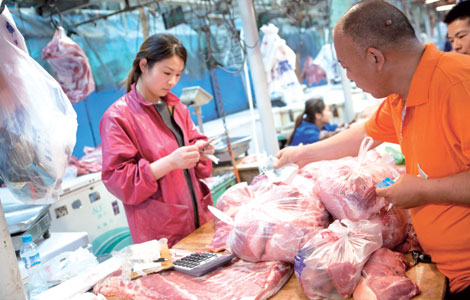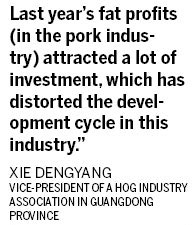Govt may act to stabilize cost of pork
Updated: 2012-05-18 09:57
By Zhou Siyu (China Daily)
|
|||||||||||
A man purchases pork at a market in Beijing. China's pork prices shot up to a record high last winter before stumbling in January and fell this week to one of its lowest points since last June. [Photo / Agencies]

Farmers may reduce hog numbers in second half to deal with losses
China's pork prices continued to decrease this week, leading to widespread losses for the industry and prompting the government to take measures to prevent the prices from fluctuating greatly during the next few months.
Agricultural analysts said the low prices might prompt a reduction in the country's pork imports from the United States this year and put downward pressure on US hog futures, which were at their lowest price last week since September.
In the meantime, the fact that pork prices, which weigh heavily in China's inflation calculations, are low could provide the government with more leeway to stimulate the country's economy, they added.
China's pork prices shot up to a record high last winter before stumbling in January and fell this week to one of the lowest points since last June.
The pork industry, also pressed by a surge in the cost of animal feed, has experienced widespread losses.
"Last year's fat profits (in the pork industry) attracted a lot of investment, which has distorted the development cycle in this industry," Xie Dengyang, vice-president of a local hog industry association in Guangdong province, told media outlets.
The National Development and Reform Commission issued a directive last Friday calling for pork prices to be stabilized and said it has started purchasing frozen pork to add to the nation's reserves.
Pork is the most widely consumed meat in China. The rise in its price in 2011 was the main reason why the country recorded a staggering inflation rate of 5.4 percent that year, well above the government's target of 4 percent.
|
|
 |
 |
In April, the country's inflation rate eased to 3.4 percent, declining from 3.6 percent in March, according to the National Bureau of Statistics.
If left unchecked, pork prices might shoot up in the second half of the year as farmers deal with their losses by reducing their hog headcounts. That will impede the government's attempts to regulate inflation and food prices, said Ma Wenfeng, a senior analyst at Beijing Orient Agribusiness Consultant Ltd, one of the largest consultancies in the industry.
In the meantime, the depressed price of pork has made the domestically produced variety of the meat able to better compete with imports, a change that is likely to prompt the country to import less pork, analysts said.
According to data from the General Administration of Customs, the country's pork imports increased by 132 percent in 2011 to 467,660 metric tons, a majority of which came from the US.
Zhang Monan, an economist at the Economic Forecast Department of the State Information Center, said the government could make more room for economic stimulus by preventing pork prices from driving up inflation later this year.
"China has been under the threat of an economic slowdown," she said. "The pressure is likely to increase during the latter half of the year."
China's producer price index, a main gauge of inflation at the wholesale level, fell 0.7 percent in April from a year earlier, signaling weak demand. The country's trade growth continued to decline in April and its prospects for the future remain gloomy.
zhousiyu@chinadaily.com.cn
Related Stories
Pork price may soar in June 2012-05-16 16:50
Imported pork contains 'lean meat powder' 2012-05-09 15:05
Cabbages cost more than pork 2012-05-09 08:06
China pork prices to hog global indicator limelight 2012-01-06 19:20
Today's Top News
President Xi confident in recovery from quake
H7N9 update: 104 cases, 21 deaths
Telecom workers restore links
Coal mine blast kills 18 in Jilin
Intl scholarship puts China on the map
More bird flu patients discharged
Gold loses sheen, but still a safe bet
US 'turns blind eye to human rights'
Hot Topics
Lunar probe , China growth forecasts, Emission rules get tougher, China seen through 'colored lens', International board,
Editor's Picks

|

|

|

|

|

|






